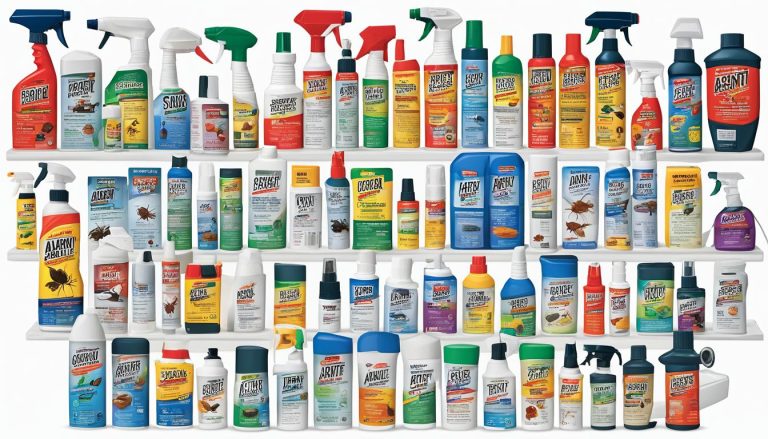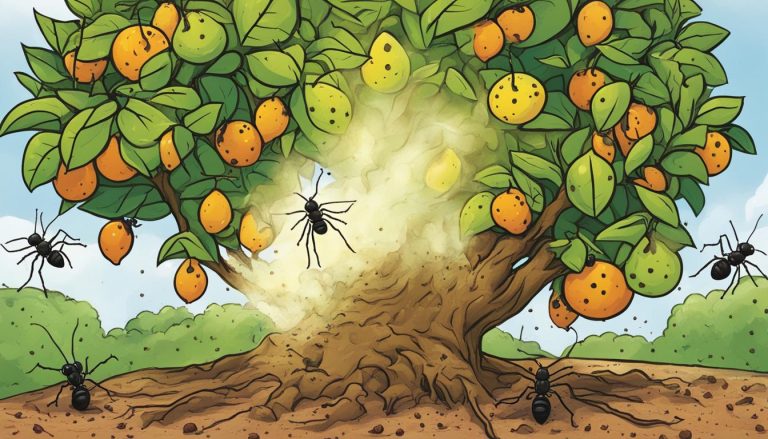G’day mate! Has your lawn been turned into a highway for ants? Getting fed up with those little critters? Don’t worry, I’m here to chat about how you can tackle ’em using the best ant control methods that are super handy. We’re talking about stuff that makes sure your lawn stays greener and your home bug-free. So, if you’re after effective lawn ant control, you’ll wanna keep reading.
Dealing with lawn ant infestation treatment isn’t a piece of cake, but it’s not rocket science either! You’ve got products like Yates Baythroid, which is fab for squashing those pesky pests in the garden. And if those ants are making a racket under places where your chook feed isn’t grown, chuck some Yates Home Pest Granule Bait at ’em. It works a treat.
What about when ants sneak inside, hey? Well, Yates Home Pest Long Term Barrier Spray’s got you covered inside and out. Plus, there’s this clever Ant & Nest Killer Gel Bait that gets the naughty ones right in their home, including the queen! And remember, keeping your soil moist stops those ants from nicking your seeds, so give your plants a good drink with deep watering trays.
We don’t wanna zap all the bugs, right? Some are mates to your plants. For those, Yates Nature’s Way Citrus & Ornamental Spray is tops because it keeps your greenery healthy without inviting the ants for a feast. And that’s fair dinkum good for your garden.
Key Takeaways
- Effective ant control includes using the right gear like Bayer and gels for your lawn.
- To get the upper hand on ants, you need a solid plan – products for the garden and tricks for indoors.
- Maintaining wet soil with watering can prevent ants in lawns from stealing seeds.
- Crack down on sap-suckers to avoid luring ants into your beloved garden plants.
- Remember, it’s not just about getting rid of ants – it’s about keeping your lawn shipshape for the long haul.
Understanding the Ant Problem in Your Lawn
When it comes to keeping your lawn healthy and free of pests, understanding the challenges posed by ants is crucial. These tiny creatures play a significant role in the ecosystem but can become troublesome when they overpopulate your green space.
The Role of Ants in the Ecosystem
Ants have some important jobs in our gardens. They move soil around, which helps to let air and water get to plant roots. They also clean up by eating dead bugs and other stuff that we don’t want lying around. But, when there are too many ants, they can start to cause problems for us and our pets.
Identifying Signs of Ant Infestations
It’s easy to spot when ants are taking over your lawn. Look out for dead patches of grass, little heaps of soil and plants that look sad and wilted. All these signs can mean that ants have dug too many tunnels and made it hard for water to stay in the soil. They also have a sneaky habit of stealing seeds right after you plant them.
Common Types of Lawn Ants in Australia
In Australia, we have lots of different kinds of ants in our lawns. Some ants are just doing their thing and not bothering anyone, but others can be a real pain. Knowing exactly which type of ant you’re dealing with is super important, so you can choose the best way to deal with them.
Let’s talk about the natural ant control for lawns and how we can manage them without hurting our beautiful grass. We have a bunch of lawn-friendly ant control solutions that can help keep the ants at bay. For those who like to tackle problems themselves, there’s plenty of DIY lawn ant control tips that are super easy to follow. And of course, when we need something stronger, we have a range of ant control products for lawns.

Whether you’re a fan of do-it-yourself remedies or prefer using ready-made items from the store, it’s all about keeping those ants in check while making sure our lawns stay nice and green.
Ant Control for Lawns: Products and Practices
When it comes to maintaining a healthy lawn, managing ant populations is a critical part of the process. A range of ant control products for lawns can help reduce and manage these industrious insects, ensuring your grass stays green and lush.
Firstly, consider using commercial-grade wetting agents, which can deter ants from building nests by improving the soil’s ability to absorb water. Another fundamental practice is to maintain a robust lawn through regular fertilisation, which naturally discourages ant settlement.

Understanding Insecticides: Different types of insecticides, such as contact, residual, systemic, and baits, each have their own role in a comprehensive ant management plan. Contact insecticides help to immediately reduce the number of ants while residual and systemic treatments provide longer-lasting protection. Ant baits are designed to be carried back to the nest, targeting the colony at its source.
Here’s a list of recommended products and their respective uses:
- PestXpert Outdoor Perimeter Spray: Perfect for treating ant nests directly and safely.
- PestXpert Nest Kill Ant Bait: A strategic choice that aims to eliminate both the queen and the colony.
Considering the safety of your family and pets, be mindful of the active ingredients in these products, such as Fipronil, Deltamethrin, Bifenthrin, and Permethrin. These compounds have different effects on the lawn ecosystem, as well as varying safety profiles which should influence your selection. Overall, following label instructions and understanding each product’s intended use is crucial for effective and responsible professional ant extermination for lawns.
Conclusion: Fostering a Balanced Outdoor Environment
Maintaining a healthy garden isn’t just about having the greenest grass on the block; it’s about creating a harmonious ecosystem right in your backyard. Taking a holistic approach to ant control is not only about removing pesky intruders but also about caring for your lawn in a way that’s friendly to the environment. Simple steps like consistent watering, managing household waste properly, and keeping your building’s nooks and crannies sealed tight make it tough for ants to make themselves at home.
Long-Term Strategies for a Healthy Lawn
It’s all about the long game – investing time in your lawn today can lead to less trouble tomorrow. Opting for natural ant control for lawns is a key part of this. It means using products and methods that get along with Mother Nature. To deter ants naturally, avoid overflowing your bins and fix those dripping taps—they’re like a welcome sign for insects! Keep your lawn’s thirst quenched without overdoing it, as good moisture can be a game-changer when it comes to preventing unwanted six-legged guests.
Professional Help vs. DIY Lawn Ant Control
When the ants get a bit too ambitious, it might be time to weigh up the benefits of DIY lawn ant control against calling in the pros for professional ant extermination for lawns. If you’re comfortable and the problem’s manageable, a bit of DIY can be effective. Grab some granules, sprays, or baits from trusted brands like Yates and PestXpert and follow those labels to the letter. But when the scale tips, and the infestation’s a bit beyond your reach, there’s no shame in enlisting professional forces to ensure the wellbeing of your outdoor oasis.
FAQ
What are the best ant control methods for lawns?
The best ant control methods for lawns include using targeted insecticides like sprays, granules, and baits, implementing natural deterrents such as essential oils or diatomaceous earth, maintaining a healthy lawn through proper fertilization, and engaging in preventative measures like sealing entry points and managing waste responsibly.
How do I identify a lawn ant infestation?
Signs of a lawn ant infestation include visible ant trails, mounds of displaced soil, patches of dry or dead grass, and the presence of wilted plants. Additionally, observing increased ant activity with ants carrying food or constructing tunnels can also indicate an infestation.
What natural ant control solutions can I use for my lawn?
Natural ant control solutions for lawns include using non-toxic substances like borax mixed with sugar, spraying infested areas with a mixture of soap and water, and utilizing deterrents like coffee grounds or citrus peels. Also, encouraging natural predators like birds or beneficial insects can help keep ant populations in check.
Can I use DIY methods for lawn ant control?
Yes, DIY methods for lawn ant control, such as homemade bait stations, natural deterrents, and organic sprays, can be effective. However, it’s pivotal to understand the type of ants you’re dealing with and to follow safety precautions when preparing and applying DIY treatments.
What are some effective lawn-friendly ant control products?
Effective lawn-friendly ant control products include those that target ants without harming your grass, such as Yates Baythroid Advanced Insect Killer for Lawns or PestXpert Nest Kill Ant Bait. Always read the label and follow instructions to ensure they are applied safely and effectively.
How do I prevent ants from coming back after treating my lawn?
To prevent ants from returning after treatment, maintain a healthy lawn through regular watering, mowing, and fertilizing. Eliminate standing water and seal cracks around your home’s foundation. Also, keep outdoor eating areas clean and free of food debris to discourage ant colonies from resettling.
When should I consider professional ant extermination for my lawn?
Consider professional ant extermination for your lawn if you’re dealing with a large-scale infestation, if DIY methods have been ineffective, or if you prefer not to handle pesticides yourself. Professionals can provide more potent solutions and targeted treatment strategies.
Are there long-term strategies for maintaining a healthy, ant-free lawn?
Yes, long-term strategies for maintaining a healthy, ant-free lawn include routine lawn care, such as proper mowing, fertilizing, and irrigating, along with natural pest management practices. Cultivating a balanced outdoor ecosystem with a diversity of plants and beneficial insects will also discourage ant colonization.






